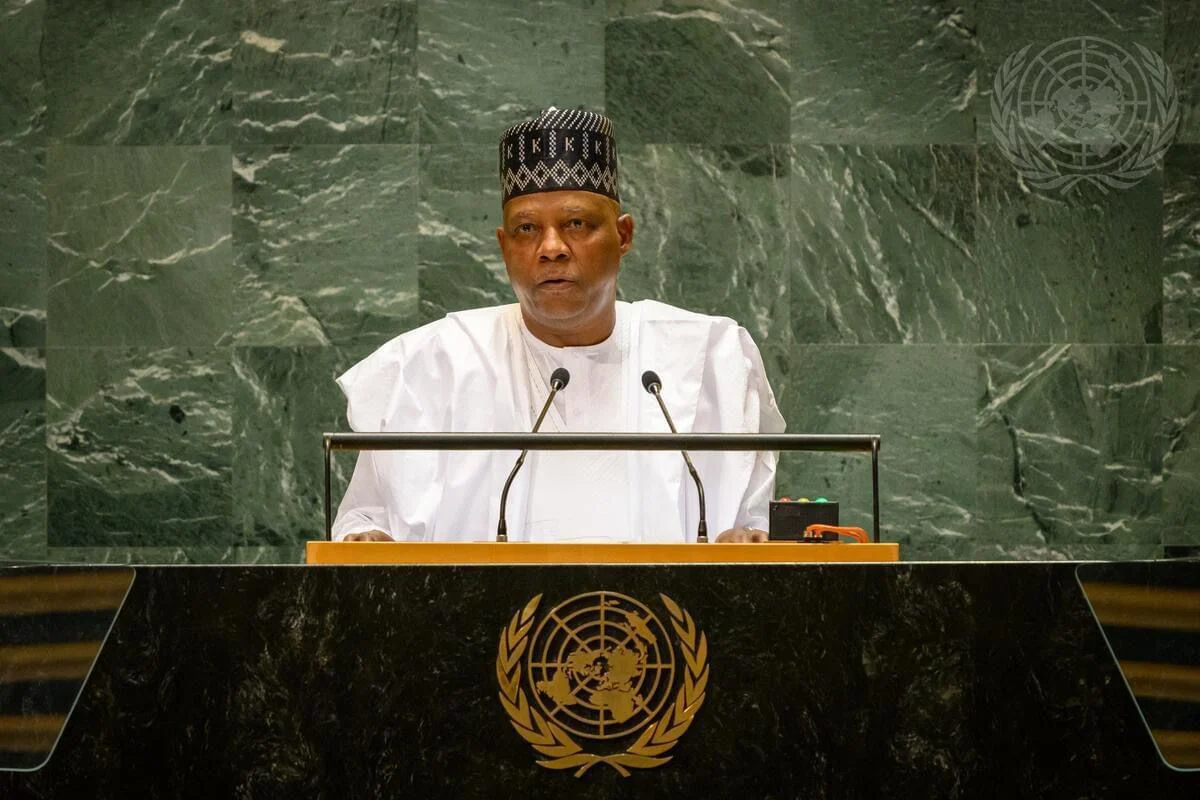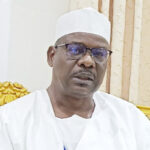Millions of Nigerians and our active or retired foreign policy professionals, particularly would feel most encouraged by the performance of the Nigerian delegation at the just concluded 79th Session of the United Nations General Assembly, ably led by His Excellency, Vice President Kashim Shettima, GCON. In a storied global arena known for electrifying speeches by world leaders, Shettima delivered a performance on behalf of President Bola Ahmed Tinubu and the Nigerian people that will be etched in memory for ages.
But to properly situate Shettima’s speech and performance, we need to first take a brief detour across the history of Nigeria’s foreign policy. The late Chinua Achebe’s last book, There Was a Country—in reference to Biafra—is perhaps best applied to Nigeria on the foreign scene. Nigeria was indeed once a great country on the world stage. At independence in 1960, and for decades after, Nigeria had a reputational standing in world affairs that was on par with some of the leading countries of the world at the time, or at least not easily dismissed. We had a voice in international affairs that was widely and hugely respected across the globe. How did this happen, and how have things changed?
It all came down to three major factors. First, our foreign policy positions, commitments, and activities were underpinned by a set of humanistic values: anti-colonialism, anti-expansionism, the promotion of human rights and the dignity of man wherever they may live, non-alignment with any competing great powers, multilateral cooperation and friendly relations with all nations, peaceful resolution of all conflicts, and most importantly, the independence, unity, security, and development of Africa. All of these values were enunciated by Sir Abubakar Tafawa Balewa during Nigeria’s first attendance at the UN General Assembly on 7th October 1960, less than a week after our independence.
Second, Nigeria had an excellent cohort of career diplomats and external affairs professionals who formulated our foreign policies based on these values and guided our governments and leaders successfully through the political minefields of the Cold War. The foreign policy professionals were in turn complemented by an independent-minded cadre of intellectuals—primarily from our universities and the media—who produced serious research, news, and informed commentary about international affairs that helped inform our foreign policy commitments, long before the advent of today’s “civil society” copy-cats. Third, and just as important, Nigerian leaders spoke with the courage of their convictions and commanded a presence at international events that was truly second to none.
- NIGERIA DAILY: What To Expect From President Tinubu’s Independence Day Speech
- FG’s earning from crude oil sales drops by 79% in 2023
It was not always easy to live up to these ideals domestically, but on the global stage at least, no one could deny our positive influence in the Organisation of African Unity (OAU), now African Union (AU), ECOWAS, South Africa, Namibia, Angola, Sudan, Liberia, Bosnia, and elsewhere besides. Nor can anyone deny the attention, respect, and admiration Balewa, Gowon, Murtala, Obasanjo, Shagari and others commanded internationally when they spoke throughout their foreign engagements as Nigerian leaders.
Sadly, Nigeria has somehow abandoned the moral imperatives that previously underpinned our foreign policy engagements, and as a result, we are no longer the moral force in world affairs that we used to be. That is what makes Shettima’s speech at the assembly of world leaders last week so significant for Nigeria today. For me, his speech and performance sought to rediscover and reclaim the moral foundations that had long informed our engagements with the rest of the world, and which consequently propelled us to greatness and respect among the community of nations. And by speaking so clearly, so vigorously, and with the courage of his convictions, the vice president was simply standing on the shoulders of our past giants—Balewa, Gowon, Murtala, Obasanjo, Shagari, Babangida—whose speeches drew positive global attention to them, and Nigeria.
I watched the speech as he delivered it live, and subsequently read the transcripts that were widely shared and published several times over. In it, Shettima surveyed some of the most serious problems confronting our world today: wars in Europe, Africa, and the Middle East, democratic development and economic and territorial security in Africa, the impending climate catastrophe, future pandemics, the potentially disruptive and corrosive effects of social media and artificial intelligence, the need for reform of the rules of global trade, and indeed the long-delayed need to reform the United Nations itself. On each of these issues, and many more, Shettima delivered short but strong statements that eloquently captured Nigeria’s positions, and more importantly, the moral force behind them.
He made clear, for example, —like President Tinubu himself did last year—that the rest of the world must engage more deeply, more constructively, and more equally with Africa if global challenges like mass migration, climate change effects, erosion of democracy, insecurity and conflict, and debilitating poverty must be tackled head-on on the continent. But for me, the icing on the cake in his speech was his bold call for an immediate ceasefire in Gaza and a clear path to Palestinian statehood, via a two-state solution. That call, simply put, reflects Nigeria’s long-held moral impulses on international conflicts: we stand against colonial subjugation and mass human rights violations of any kind, just as we stand for human dignity and peaceful resolution of conflicts. Nigeria has long stood for these values in the global arena, and it is refreshing to rediscover and reclaim them today.
It is difficult to overstate the significance of that position by Nigeria, but it should be enough to say that it is by taking such non-political but deeply moral positions that countries earn the respect of others on the world stage. It is what we did in Namibia, South Africa, and elsewhere at the peak of our global influence but crucially, an area where South Africa has now taken the lead as the moral face of Africa. If Nigeria must regain its position as the moral and political leader of Africa, it cannot shy away from making its position known on the deeply moral and political questions of the age—and few such questions are more so than the Palestinian one. It is, and this must be said, in that sense that our delegation’s clear enunciation of Nigeria’s position on Palestine must be commended and celebrated by all.
How disappointing then, and this must be said too, that newspapers and other media back home here reported the speech mainly from less important and groveling angles like the call for debt relief. Perhaps our editors thought that reporting the speech from that angle would be controversial, given the deep religious cleavages in Nigeria. But as every informed adult on this planet knows, the Palestinian is a moral one, not a religious one, after all, there are hundreds of Christians among the thousands of Palestinians killed, injured, or displaced by Israeli bombs since October last year, just as there have been many Christian homes, churches, schools, and hospitals destroyed in Gaza since then, and long before.
Perhaps our newspapers caved in to the ignorant and garrulous mob on social media who think that calling for a ceasefire in Gaza and statehood for Palestine is somehow a taboo for a Nigerian president. But it is precisely by taking such principled and morally unimpeachable positions in world affairs that great presidents and great countries are made.

 Join Daily Trust WhatsApp Community For Quick Access To News and Happenings Around You.
Join Daily Trust WhatsApp Community For Quick Access To News and Happenings Around You.

